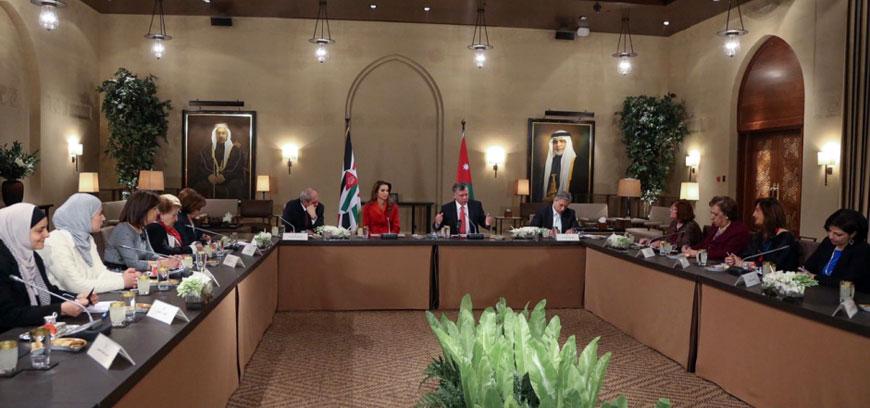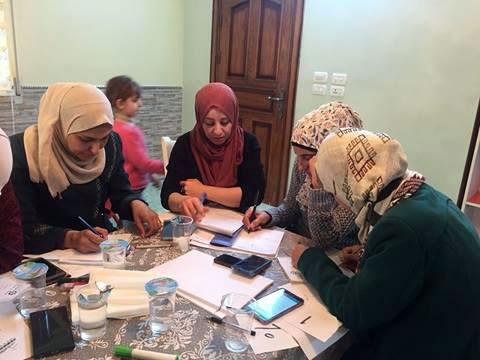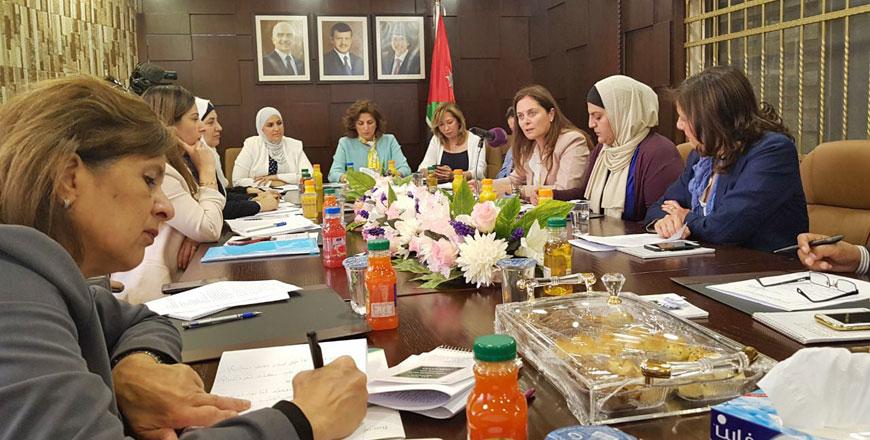You are here
Women advocates hail two decades of ‘outstanding’ King’s support for women
By Rana Husseini - Jun 08,2019 - Last updated at Jun 08,2019

His Majesty King Abdullah, accompanied by Her Majesty Queen Rania, meets with Jordanian women leaders in March, 2015 (Photo courtesy of Royal Court)
AMMAN — Leaders of the Jordanian women’s movement commended the leadership and wisdom of His Majesty King Abdullah since the Accession to the Throne 20 years ago, citing his efforts towards more rights and key legal amendments that led to female empowerment and engagement in various fields.
“There has been a huge leap in several areas related to women’s empowerment in Jordan in the past 20 years including major changes in some of the legislation and successful efforts to create the right atmosphere for women to assume more roles in the political life and decision-making positions,” said Sisterhood is Global Institute Executive Director Asma Khader.
Khader, a former minister, told The Jordan Times that some of the long-awaited laws that were amended in favour of women were related to gender-based violence, the Election Law, the Labour Law and the Personal Status Law among others.
President of Jordanian National Commission for Women Salma Nims added: “When we look at the past 20 years, we find that there were many breakthroughs for women including in the political life, the civil society and legislative changes.”
“We saw a drastic increase in women’s political participation and a larger role for the civil society and women’s organisations in lobbying and drafting strategies,” Nims told The Jordan Times.
Veteran Judge Ihsan Barakat, the first woman to be appointed to the Judicial Council and the Court of Cassation, said the support by King Abdullah has led to the increasing the number of female judges.
“We have women judges in almost all the courts and judicial entities, including one assistant to the general attorney at the Criminal Court and a judge serving at the Judicial Council,” Barakat told The Jordan Times.
Arab Women Organisation Programme Director Laila Naffa pointed to the many international resolutions that were adopted or ratified in the past 20 years that were in favour of women in peace and conflicts.
“UN Resolution 1325 related to peace and conflict was ratified by Jordan in 2000 and King Abdullah signed the national action plan and eventually the Jordanian government began implementing it,” Naffa told The Jordan Times.
The UN resolution addresses women’s safety and security in times of war and conflicts, considering women as an active factor in peace and war, and committing UN member states to take measures to implement the decision.
Another important achievement according to Naffa was cancelling the reservation on Article 15 of the Convention on the Elimination of all Forms of Discrimination against Women, which gives women freedom of mobility and the choice of residence without the consent of their husbands or other male family members.
SADAQA executive board member Sahar Aloul told The Jordan Times that the past years have seen some momentum in policy change concerning women’s economic participation, mainly the recent amendments to the Labour Law.
“Although female economic participation is still one of the lowest in the region at around 14 per cent, the women’s movement and civil society organisations’ efforts have culminated in the amendment of six articles in the Labour Law to become more gender sensitive and hopefully, as we move towards the implementation phase, they will further facilitate women’s entry into the workforce,” Aloul said.
Gender-based violence laws
Several laws have been introduced over the past 20 years that tackled gender-based violence and others that opened the way to establish safe houses for abused women.
“The 2018 opening of the ‘Amneh House’ [‘safe’ in Arabic], which is also called the ‘Guest and Rehabilitation House for Women’ whose lives are threatened for reasons related to family honour, was a major achievement that we were pushing for a long time,” Khader said.
Other important steps adopted by the government to better protect women, according to Khader, included opening the first government-run Family Reconciliation Centre, which was inaugurated by Her Majesty Queen Rania in 2007, and opening similar facilities in several governorates.
Nims also pointed out the importance of cancelling Article 308 and amending Article 98 of the Jordanian Penal Code.
In August 2017, Parliament voted to abolish Article 308 of the Jordanian Penal Code, which allowed sexual assault perpetrators to escape punishment if they married their victims.
A Royal committee had suggested abolishing the article in February of that year and the government endorsed the decision shortly afterwards.
Meanwhile, Article 98, amended in July 2017, stipulated that the perpetrator of an “honour crime” could benefit from “mitigating circumstances” if the individual claimed to have been suffering from intense rage when committing the crime.
“We never expected to see changes or abolishment for these two articles in specific and we consider this is as a major victory for women in Jordan,” Nims added.
Meanwhile, a new Family Protection Law, which was first introduced in 2008 and enforced recently, was considered an important achievement for women according to Khader because it meant that the government acknowledged that Jordan has a domestic violence problem and, accordingly, victims needed better protection,
She also pointed out the alternative punishment that was stipulated in the newly amended Penal Code upon recommendations by a special Royal committee that was formed for this purpose.
“Introducing the alternative punishment protected women in particular from social stigma and dangerous ramifications such as being abandoned by their families or divorced for entering the prison,” Khader stated.
Political participation
Nims pointed out that the number of female deputies since the introduction of a women’s quota in 2003 has risen from six to 20, including five who won in actual competition.
“There has been also a noticeable increase in women’s representation in the municipalities and the percentage has reached around 35,” Nims said.
The activist added that women’s representation in the political parties also increased to reach 35 per cent, while in trade unions and professional associations, the percentage was 21 per cent.
Meanwhile, the number of women ministers has also been doubled in the past 20 years.
“In the 1980s and until the early 2000s we always cheered when a woman was appointed to the Cabinet. But today we have five female ministers and in one instance, we had a female deputy-prime minister,” Nims said.
Personal Status Law (PSL)
The PSL has undergone several amendments and additions that have been considered in favour of women in the past 20 years, according to Khader.
One major addition was the introduction of the Alimony Fund in 2010 that became fully operational seven years later, Khader explained.
“The Alimony Fund enables divorced women to support themselves and their children in cases where the ex-husband is unable to provide alimony or has fled, which means they no longer have to go through the hustle of going from court to court to receive the financial support they need for themselves and their children,” according to Khader.
Another important achievement was the introduction of the Khulo Law (a divorce initiated by women in which they disclaim certain rights in exchange for a speedy judgment) in 2003.
The Khulo Law, which was later renamed the Iftida Law, gave women the right to divorce their husbands without any justification in return for financial compensation.
“Before the introduction of this law, it was almost impossible for women to get a divorce from a Sharia court. This law worked to safeguard women’s well-being and freedom of choice,” Khader maintained.
Privileges for children of Jordanian women married to non-Jordanians
Naffa pointed out that there was “a small but important step” to grant children of Jordanian women who are married to non-Jordanians certain privileges.
In 2014, the government pledged to ensure the proper provision of the “privileges” it had granted to children of Jordanian women, which included residency permits, driving licences and real-estate ownership, along with other benefits in the educational, health, labour and investment sectors.
“This is a small but important step to ease up the pressure on these families and to help them proceed with their life without having to feel that they are being discriminated against just because they do not carry the Jordanian nationality,” Naffa said.
Human Trafficking Laws
The government took concrete steps to combat human trafficking in Jordan in 2009 by introducing the first national law to prevent human trafficking.
Almost 10 years later, the government approved an amendment to the 2019 Anti-Human Trafficking Law, which aims to implement harsher punishments on those charged with crimes related to human trafficking to ensure justice and deter these offences.
The bill also provides victims of these crimes with protection and the necessary assistance to help and care for them as well as establishing a fund at the Ministry of Justice to provide help and care to those affected by human trafficking.
“These steps were extremely important since the majority of human trafficking victims are women,” Naffa explained.
Changes to the Labour Law
The Labour Law has seen important amendments and additions that facilitate women’s participation in the job market, according to Aloul.
“These amendments ensure gender justice and will contribute to an increase in the employment of women and their continued stay in their jobs, which will eventually reflect on the percentage of female’s economic participation in the labour market,” Aloul said.
Another economic win for women this year, according to Nims, was the issuance of instructions that obligated educational institutions in Jordan to transfer the salary of their female employers directly to the bank, “since, in the past, many female educators complained of not being paid on a regular basis, nor were they receiving their full salaries on some occasions”.
Some of the major amendments, according to Aloul, are that it has become mandatory for institutions with over 20 female employees to offer day-care services for their employees’ children younger than four.
Another amendment, Aloul said, was introducing the flexible working hours system, which included a better definition of flexi-hours, which benefits women the most.
Another important article that was introduced in the Labour Law was designating a three-day paternity leave for fathers, according to Aloul.
Judicial branch changes
Judge Barakat pointed out that there was a rapid increase in women’s representation in the judicial branch, noting that currently, the percentage stands at 24 per cent, which means that “one in five judges are women”.
“Since the appointment of the first female judge in 1996 until 2002 the number of female judges were very low and did not exceed five judges,” Barakat explained.
Today, Barakat added, there are 215 women judges serving in various courts and judicial entities, including several women being named as presidents of important courts, such as the magistrates and juvenile courts.
“There is one female judge in the Judicial Council, women judges also served in the general prosecutor officer, prosecutors, judicial inspectors and other important judicial positions,” Barakat added.
SSC laws
Another important change that worked in favour of women’s economic empowerment was establishing a motherhood fund at the Social Security Corporation (SSC), according to Nims.
This law stipulates that all employers pay a percentage to the fund that would go towards covering the salaries of working women during maternity leave.
“This means that companies will not be hesitant to hire newly-wed or pregnant women,” according to Nims.
Another major achievement that was amended in the SSC, Nims said, was ensuring that the children of the deceased women would continue to take her pension and that their husbands who suffer from disabilities or without an income would also benefit from the allowance.
Khader concluded that the majority of the changes over the past 20 years were “ground-breaking and this really reflected a strong and true commitment by the leadership towards women’s rights in Jordan”.
“We still need to work hard and we are hopeful in the coming years that the King will continue to eliminate all the obstacles that face women including their participation in the labour market, which I consider as the biggest challenge,” Khader added.
Nims added that “the changes we have witnessed over the past 20 years are positive indicators that more laws will be addressed in the near future to further empower women to increase their political and economic participation”.
Naffa concluded by saying that the hope is to see more positive changes in the near future such as “integrating relevant international laws and conventions in our own laws and hopefully ensure that women are represented in all spheres of life with a minimum of 30 per cent”.
Related Articles
AMMAN — Women’s rights activists said 2018 witnessed little in the way of achievements when it came to laws and legislation, but their major
AMMAN — Women’s rights activists on Saturday said many achievements were made since the Kingdom was founded 100 years ago, expressing hope t
AMMAN — The women’s movement in Jordan on Wednesday launched a coalition to work on increasing female participation in the labour market and














